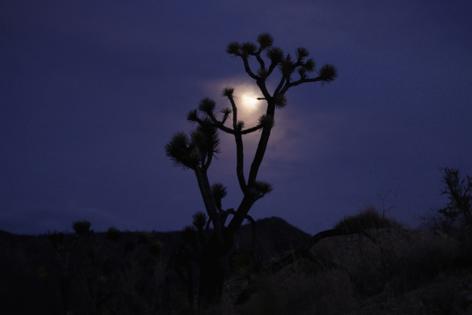Commentary: Joshua trees survived being loathed. Now they're beloved and at risk
Published in Op Eds
Joshua trees face an uncertain future. Scientists warn that without significant climate action, the species could be functionally extinct by 2070 because of climate change.
The recent government shutdown left Joshua Tree National Park vulnerable to vandalism during peak visitor season, with the Mojave Desert Land Trust reporting graffiti and habitat destruction. Conservation groups have petitioned for federal protections under the Endangered Species Act. “Love them, hug them, kiss them even, but never climb or hang from them,” the National Park Service reminded visitors after Miley Cyrus posted photos of herself hanging from an ancient Joshua’s branches in 2019.
The affection is genuine. Visitor numbers at Joshua Tree have been among the fastest-growing for any national park. Millions visit annually, seeking Instagram backdrops with the trees’ distinctive silhouettes.
But doing research for a book on Joshua trees, I discovered something unexpected: White Americans who first encountered these trees didn’t just dislike them. They despised them with a passion rarely directed at any plant species.
The historical record reveals remarkable vitriol. Explorer John C. Frémont’s 1844 description of the Joshua tree as “the most repulsive tree in the vegetable kingdom” was just the beginning. What followed was a cascade of Victorian-era contempt.
Writers called the trees “grotesque,” “infernal” and “uncouth.” The flowers were described as “dull, lead colored things,” “fetid” and “horrible … exceedingly disagreeable.” One observer noted the tree was “weird, twisted” and had “a nightmare effect even in broad daylight.” Another wrote that the trees “waved their arms like grotesque monsters in pain.”
Even the tree’s biblical namesake couldn’t redeem it. One writer noted there was “no great compliment involved in having this spiteful looking object for a namesake.”
Lou V. Chapin, writing in the Los Angeles magazine Land of Sunshine, looked forward to the day when these “demoniacal specters of the plains” would be eradicated from the earth. He imagined the hiss and pop of their burning logs gladdening “many a humble fireside.”
Francis Fultz, an educator in L.A., wrote in 1919: “Whenever I see the Joshua trees, I think how considerate they have been in choosing to make their home where few men have a desire to live.”
The hatred wasn’t merely aesthetic. In the 1870s, a San Francisco entrepreneur named Judge Walker saw profit potential in Joshua trees. Securing investment from as far as London, he constructed paper mills in the desert outskirts of Los Angeles County. The “paper tree” promised to supply the booming demand for “California cactus paper.”
The timing was significant. Southern California boosters were discovering that the region’s “semi-tropical” climate could be marketed as a healthful paradise. To launch what would become the most systematic land promotion campaign yet attempted in America, they needed paper.
For a brief moment, it appeared the reviled Joshua tree would serve this purpose. Southern California’s “Edenic” climate would be promoted on paper made from the pulped trunks of “demoniacal” trees. But the economics didn’t work. Boiling Joshua tree pulp proved too costly, and the mills failed.
How did America’s most hated tree become beloved? The transformation happened gradually, tied to broader cultural shifts.
As Southern California transformed from frontier to metropolis, the desert changed from obstacle to destination. The automobile made the Mojave accessible for recreation. Mid-century Americans began to see the desert differently. What struck settlers as barren and hostile became austere and beautiful to tourists. The Joshua tree’s strangeness shifted from repulsive to striking.
By 1994, when Joshua Tree National Park was established, the transformation was complete. The trees that early Americans couldn’t wait to eradicate had become icons worth protecting.
By now the historical amnesia is almost total. Few people who visit Joshua Tree National Park today know that the species was once universally reviled. Fewer still recognize the deeper irony: The lifestyle that Southern California pioneered and exported globally — car-dependent, consumption-driven, sprawling — is now altering the climate in ways that threaten the Joshua tree’s survival.
The tree once marked the gateway to the Southern California paradise that early boosters sold to America. Now the lifestyle that paradise created may eliminate the tree entirely.
Yet there is reason for measured optimism in the historical record. Joshua trees consistently disappointed people who tried to exploit them. The paper scheme failed. Other extractive ventures proved unworkable.
The stubborn refusal of Joshua trees to be useful, their failure to bend forever toward any desired human end, makes me want to believe that they might refuse once again to follow the narrative we expect for them. Perhaps stubborn Joshua will defy the best predictions of our scientists and survive long past this century. It doesn’t hurt to hope — nor does it to extend a helping hand.
The fight to save Joshua trees is inseparable from the fight to address the climate crisis that threatens them. We find ourselves in a curious historical moment: rediscovering our forebears’ hatred of Joshua trees just as we’ve fallen in love with them, and scrambling to save them from the consequences of the lifestyle we built in their shadow.
____
Barret Baumgart is the author, most recently, of “Yuck: The Birth & Death of the Weird & Wondrous Joshua Tree.”
_____
©2025 Los Angeles Times. Visit at latimes.com. Distributed by Tribune Content Agency, LLC.
























































Comments